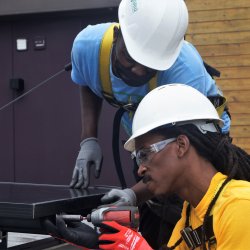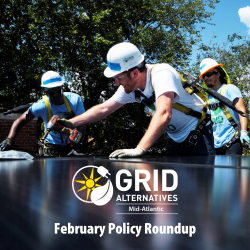Welcome to this month’s GRID Alternatives Mid-Atlantic Policy Roundup! Each month this newsletter highlights the role of policy advocacy in making renewable energy equitable in the Mid-Atlantic and across the nation.
Building strong, equitable energy policy is a long process.
Last year’s enactment of the transformative Inflation Reduction Act (IRA) unlocked hundreds of billions of dollars in climate investments over the next decade. All the money at stake multiplies the need for strong advocacy at the federal, state, and local levels to make sure underserved communities are the priority.
That's where we come in. Our track record of expanding solar access in our community provides a model to help advocates and policymakers advance climate justice and broaden the toolkit for implementing energy equity.
We truly appreciate your support of our work. If you share our vision of a world powered by renewables that benefits everyone, please donate today!
Here are the latest updates in renewable energy policy locally and nationally:
District of Columbia
Several promising bills have been introduced by Councilmembers to expand clean energy infrastructure around:
Earlier today, I introduced legislation (w/ all CMs) to dramatically expand DC's EV charging infrastructure. To meet our climate goals, we have to see the gulf between what we have & what we need. This bill will make EV charging fast, equitable, convenient, & more accessible. pic.twitter.com/dzUFcE5FJf
— Charles Allen (@charlesallen) January 31, 2023
The Council is also engaged in agency oversight supporting the work of our partner agencies such as the Department of Energy and Environment (DOEE) and Department of Employment Services (DOES). We greatly appreciate Councilmembers’ recognition of the importance of an equitable clean energy future.
Finally, we are joining other local organizations in calling for the DC Public Service Commission (PSC)—our utility regulators—to advance several important proceedings. PSC’s work with stakeholders through these proceedings is essential to move the District’s climate and energy policies forward with sufficient justice, wisdom, and speed to take full advantage of IRA (and Bipartisan Infrastructure Law) funding opportunities.
Maryland
Maryland’s General Assembly is in full swing, with some excellent legislative opportunities to further advance climate and energy justice in the state.
Among these are a bill to make permanent the Community Solar Energy Generating Systems Pilot Program. The amendment would include a requirement that systems provide at least 40% of their output to low- and moderate-income subscribers. This would be great news for Marylanders who, for whatever reason, cannot put solar on their own roofs.
Another bill would enshrine in state law the Biden-Harris Administration’s Justice40 commitment. This measure would require at least 40% of overall spending on certain climate and energy related programs, projects, or investments to benefit communities with low- to moderate-income households.
These and other bills show the impact of our vision of advancing economic and environmental justice through renewable energy.
Virginia
Sadly, bills to expand shared solar in Virginia were not enacted by the General Assembly during its short 2023 session. However, we're heartened by the unanimous support for legislation to enhance the State Corporation Commission’s authority to ensure just and reasonable utility rates.
We congratulate State Senator Jennifer McClellan, a lead proponent of that legislation as well as the Virginia Clean Economy Act of 2020, for her election as the first Black woman elected to represent a Virginia congressional district in the U.S. House of Representatives.
Brava! @JennMcClellanVA, a veteran Democratic state senator, won a special election for Virginia’s Fourth Congressional District making her the first Black woman to represent the state in Congress. https://t.co/KzUlzE9uW9
— Susan Spector McPherson (@susanmcp1) February 23, 2023
More uplifting news: Virginia’s energy office has begun laying the groundwork for successful applications for federal IRA funding streams. We look forward to working with Virginia Energy and its Clean Energy Advisory Board on ways to use those funds to build wealth and resilience in the Commonwealth’s environmental justice communities.
Federal
This month, the Biden-Harris Administration issued several initial program guidelines for pieces of the IRA that will promote a more just transition to clean energy. As these and other guidelines roll out in 2023, we're committed to working with our local partners and communities to support truly equitable access to the benefits of these programs through advocacy, information-sharing, and capacity-building.
The Environmental Protection Agency (EPA) is building two large competitive grant programs based on concepts that GRID has supported since the earliest discussions around what would become the IRA:
- One would promote clean energy financing through a green bank or banks, using $20 billion (with 40% specifically earmarked for low-income and underserved communities!) to leverage many times more private funding to build clean energy projects around the country.
- The other, known as the Zero-Emissions Technology Fund, dedicates $7 billion to states, Tribes, municipalities, and eligible nonprofit entities for policies and programs to enable the deployment of residential rooftop solar, community solar and associated storage and upgrades in low-income and disadvantaged communities.
Meanwhile, the Treasury Department, working alongside the Department of Energy (DOE), issued some initial guidance on how it will approach the Low Income Communities Bonus Credit Program established by the IRA to boost tax credits for solar, wind, and storage projects that advance energy equity. We strongly support this crucial program, and we are working closely with partners to make sure that it is implemented in a way that starts bringing meaningful economic benefits to households and communities without delay.
We have flagged some technical fixes needed to prevent rooftop solar, residential energy storage, and other project types from being left behind, and we are also continuing to push for Treasury to align more closely with our recommendations in future years for the most effective, inclusive, and just program possible.


